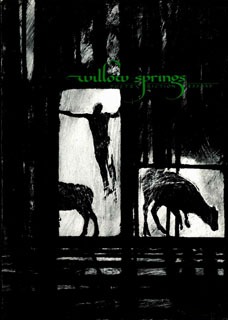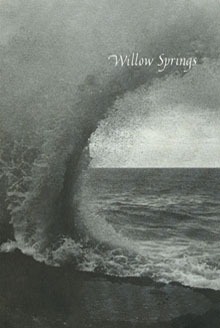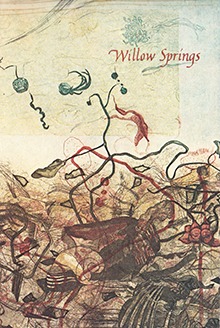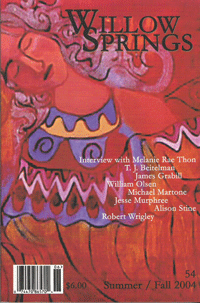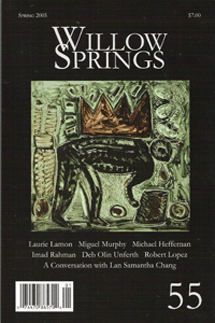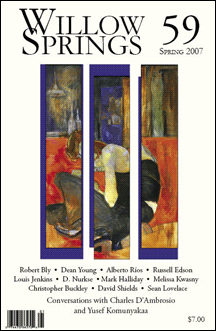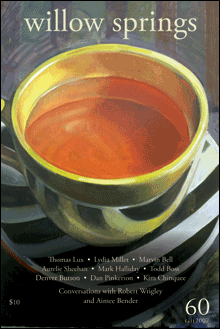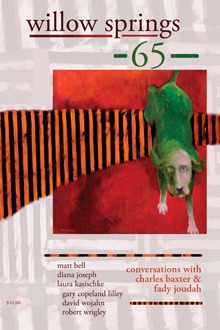NIGHTS, WE CLIMB to the tower's roof to stand together beneath the satellite dishes, where we watch the hundreds of meteorites fall through the aurora and across the arctic sky.Trapped high in the atmosphere, they streak the horizon then flare out, with only the rarest among them surviving long enough to burst into either mountains or tundra, that madness of snow and ice beneath us.
Once, Cormack stood beside me and prayed aloud that one might crash into the receiving tower instead and free us all.
Once, I knew which one of us Cormack actually was.
II
THE TOWER IS TWENTY STORIES TALL, made of blast-resistant concrete and crowned by two satellite dishes twisting and turning upon their bases, their movements driven by the powerful electric motors installed between the listening room and the roof. The larger dish is used for receiving signals and messages from both our own commanders and our enemies, the latter of which we are expected to decode, interpret, and then re-encrypt before passing them to our superiors using the smaller transmitting dish.
It has been months since the larger dish picked up anything but static, maybe longer. Some of the men talk openly now about leaving the rower, about trying to make our way to the coast, where we might be rescued from this place by the supply transport that supposedly awaits us there. These men say the war is over, that—after all these years—we can finally go home.
The captain lets the men speak, and then, calmly, asks each of the dissenters where they are from, knowing these men will not be able to remember their hometowns, that they haven't been able to for years. The captain, he always knows just how to quiet us.
III
AS I REMEMBER IT—which is not well—young Kerr was the first to grow dim. We'd find him high in the tower's listening room, swearing at the computers, locking up console after console by failing to enter his password correctly. At night, he wandered the barracks, holding a framed portrait of his son and daughter, asking us if we knew their names, if we remembered how old they were. This is when one of us would remove the photograph from its frame so that he could read the fading scrawl on the back, the inked lines he eventually wore off by tracing them over and over with his fingers, after which there was no proof with which to quiet his queries.
Later, after he had gotten much worse, we'd find him on the roof, half frozen, sleeping beneath the receiving dish, his arms wrapped partway around its thick stem, his mind faded, his body lean and starved and frostbitten.
None of us realized he was missing until we found his body, trapped in the ice just inside the compound's gate. What pain he must have felt after he threw himself from atop the tower, after he tried to crawl forward on crushed bones, heading in the direction of a coast he must have known he would never live to see.
IV
MY NAME IS MAON, according to the stitching across the breasts of both the uniform I am wearing and all the others hanging in the locker beside my bunk. This is what it says beside my computer console in the listening room, and what the others call out when they greet me. It is what the captain snarls often in my direction, growling and waving his machine pistol to remind me that he is the one giving the orders, not me.
My name is Maon: Some mornings, I stand before my mirror and speak this word again and again, reminding myself as I stare at my reflection, surprised anew by the gray of my hair, by how the winter of my beard mimics the snow and ice outside. I have begun to put on fat, to find my stomach and face thicker than I believe them to be away from the mirror. Caught between the endless dark outside the tower and the constant fluorescence of our own gray halls, it is too easy to mistake one time for another, to miss meals or repeat them. My mouth tastes perpetually of cigarettes and salted beef, and my belly grows hard and presses against the now strained buttons of my uniform. Sometimes, I can't remember having ever eaten, though my stomach is so full of food I am often sick for hours upon hours.
V
IT WAS ONLY AFTER KERR DIED that I discovered our personnel records had been deleted: birch daces, home towns, the persons co be notified in the case of our deaths, all these crucial faces gone. From chat moment on, we had only our tattered uniforms to prove our ranks, only the name tape attached to our chests to remind us who we each were.
Without the personnel records, it also became impossible to determine the date we're to be released from service and taken to the coast for transport home. According to the captain, this meant none of us could go home until we re-established contact with the main force, something he see ms increasingly uninterested in trying to do.
Once, Macrath and the others came to me and asked me to speak to the captain, to inquire after our missing records. The next morning in the mess hall, I did my best to convince him to honor their requests. It would only cake a few minutes, I said. You could do it right now.
Probably there's no one out there listening, but even if there is, they won't respond without your authorization codes.
The captain finished chewing before looking up from his breakfast of runny scrambled eggs and muddy coffee. His eyes flicked from my face co where Macrath stood behind me, then back again. He said, Are you trying co give me an order, Maon?
No, sir. A suggestion, maybe.
The captain's voice was stern, providing no room for argument. When I turned to leave, I saw Macrath still standing there, his eyes murderously red-rimmed and locked onto the captain's own implacable black orbs, on those irises as shiny and flat as the surface of burnt wood. Macrath only wanted to go home. He had a family, a wife and children, a little house, a car he liked to tinker with on weekends. That's what he always told us, what he believed he remembered.
When the captain acted, it was not me he targeted but Macrath, ordering some of the men to haul him into the frozen courtyard, then following behind to deliver the fatal bullet himself. The captain explained that the orders to execute Macrath had come from higher up the chain of command, in a coded comm unique meant for his eyes only. Even though it was I who had manned the silence of the listening room all morning, I said nothing, counseled the others to do the same. As I had once warned Macrath: We must not cross the captain too often, and certainly not when he is in a killing mood.
VI
T H E CAPTAIN IS UNSHAKABLE in the face of our questions, but perhaps he, too, knows nothing more than what we know ourselves: that there are no more signals, no signs of either friend or foe. When we ask if our transport is still moored at the coast, waiting for our return, he refuses to answer. He says that information is only available on a need-to-know basis, and that we don't need to know. We disagree. If the ship is still waiting, then we could make a try for the coast, leaving this wasteland behind. Perhaps then we could find a way to stop our fleeing memories, to slow the dimness that replaces them. In the meantime, we blame our forgetfulness on anything we can, scapegoating the tower first and the components of our lives here second. It could be the radiation from the satellite dishes, or the constant darkness, or the fact that the only foods we eat are yeastless wafers of bread, jugs full of liquid egg substitute, tins of dry, salty beef, plus powdered milk and powdered fruit and powdered everything else. Together, we all eat the same three meals, day after day after day, our taste buds grown as dull and listless as the brains they're connected to, until the repetition steals away our past lives, until our minds are as identical as our gray beards, our curved paunches, our time-distressed uniforms.
VII
STANDING IN THE DARK among the mechanical workings of the two satellite dishes, I work swiftly to repair a series of frayed wires splayed out from the larger dish, my fingers shaking beneath the tight beam of my headlamp, frozen even through the thickness of my gloves. It has been dark as long as I can remember, long enough that the sun grows increasingly theoretical, abstract. My own memories of it faded long ago, so that all remembrances of places lit not by torches and floodlights are suspect, at best, just more evidence of a past increasingly faked and unlikely, stolen from the remnants of the others who share this tower.
When I finish my task, I stand and look out from the rower's edge, studying the ice and snow and wind and, above it all, the aurora, its bright curtains of color cutting a ribbon through the darkness, obscuring much of the meteor shower that continues to fall. I linger until the cold penetrates the last of my bones, then I turn the metal wheel atop the frost-stuck hatch, descend the rickety ladder leading back into the tower.
An hour later, lying in bed, I am unable co remember the colors of the aurora, or even what exactly I went outside to fix. The events of my life increasingly exist only in the moment, too often consumed by their own bright fire, lost like the many meteorites tumbling and burning out across the already unimaginable midnight sky.
VIII
ONCE A WEEK, after we're sure the captain is asleep in his quarters, we gather in the basement of the tower, amidst the stacked pallets of canned and powdered foodstuffs, the whole rooms of spare wiring kits and computer parts and d rums of fuel oil, where there is enough of everything to last another hundred years. There are six of us who meet, the only ones who still remember enough to work, who can still log into our computers. Weeks ago, we changed our passwords to "password," so that as we continue to dim we will still be able to log in and listen for the orders we hope we might yet receive.
In the basement, we take turns telling whatever stories we can. Tonight, Camran tells us about playing baseball in high school, about how the smell of the grass stuck to everything, to his clothes and hair and fingers, and then about the sound of the bar striking the ball, how he once hit three home runs in a single game. Lachlann brags about all the sex he got before coming here, going on and on in his gravelly voice about all the tits and ass, about the pussies as slick as ice, over and over until our eyes bulge, until we beg him to stop.
Earc speaks of his parents, who he still misses, a strange bur touching admission for a man his age, and then Ros tells us about his favorite dance club back home, about the heaving crush of the dancers. We look around at the meagerness of our group, and when we try to imagine hundreds of people in one place, we find that we cannot.
I talk—as I always do—about the ship and the base camp and the coast. I have forgotten everything so chat I might remember this, for myself and for the rest of us. Better that I never again recall my family, my friends, my former home, if it means remembering the ship, our last hope, because if I forget, the captain will have won and none of us will escape this tower.
We go on speaking until we've exhausted ourselves, until we've shared everything we still have left to share. Every week, this takes less and less time. Where there were once eleven of us, soon there will be only five, then four, and then three and two and one. And then the treason of these meetings will cease to exist altogether.
IX
CAMRAN IS DEAD by the captain's hand, shot at his station in the listening room. The force of the bullet shatters his face, spraying his monitor and lodging wet flecks of skull and teeth between the once cream-colored letters of his keyboard. The captain surveys our shocked expressions, then accuses Camran of trying to use the transmitting dish to send an unauthorized message, an act of disobedience as punishable as any other. As we watch, unable to see around the bulk of his body, the captain silently reads the sentences typed across the flickering green screen, his lips moving wordlessly as his eyes scan from left to right. When he is finished, he fires a bullet into the computer, showering the leftovers of Camran with sparks. We beg him to tell us what the message said, but he only gestures to his lieutenant, Dughall, the only other who'd seen the screen.
The captain puts away his pistol, then takes a deep breath, sucking in a lung's worth of cordite and blood smoke. He says, Let Dughall tell you, as he told me.
But of course Dughall has already forgotten—it's been months since he's been to one of our meetings—and so there's no one to tell us what message might have gotten out, or if there has been any response. All we want is something to hope for, and this the captain refuses us.
We could push the captain further but there is only so much we can risk. We all have our sidearms, but he's the only one who still has bullets, having convinced us to surrender our own to his care some time ago, when our troubles first began. Now the threat of automatic fire from his machine pistol prevents us from asking too many questions, from arguing against even his harshest orders.
After silencing our protests, the captain orders Dughall and some of the other dim to carry what's left of Camran down the stairs and our into the courtyard. The rest of the men go back to their work, but not me. I climb to the roof, where I watch the dims stack Camran atop the pile of our other dead, our frozen and forgotten friends.
X
THE CAPTAIN IS IN A FOUL MOOD TODAY, in response to our persistent nagging about Camran, and to our continued speculation about the chances of making it to the shore if we were to try as a group. He rants at us for planning to abandon our posts without leave, then decides to make an example out of two of the longtime dim, Onchu and Ramsay, both so far gone they can barely speak. He dresses them in their furs, then shoves loaded packs into their arms—already provisioned to the point of bursting, as if he knew this day was coming. He pushes them both out the door, kicking at them and threatening with his pistol when they protest. He points toward the south, which I myself only know because it is the opposite of where I see the auroras over the mountains, then forces them across the courtyard, through the gate and out on to the ice. Within minutes they're out of sight from the ground, but from the roof we watch through our night scopes as they wander against the wind and blowing snow, unable already to remember which direction they've come from or where they're going.
Only a few hundred yards from the gate, Onchu sits on the ground, facing away from the rower, too far to see or hear us above the howl of the wind. We scream anyway, begging him to get up, to keep moving, to make for the coast, to save us all, only he doesn't move. He just draws his limbs in, hanging his hooded head between his knees. By morning, he will be frozen to death, and then, some time after, we will forget his name. Ramsay—somehow— finds his way through the dark and the blowing snow back into the courtyard, where the captain shoots him dead, as he has so many others who have refused to go into the wastes, who have returned without his leave.
XI
EVENTUALLY, THERE IS A MEETING at which I wait alone until dawn before returning to the barracks. With no one to tell stories to, I walk the rows of bunks instead, watching my men slumber, their gray heads full of dim dreams. A week later, I find Lachlann dead by his own hand, hanging from the rafters in the supply closet. The captain cuts the body down himself, has it dragged outside and stacked with the others. He asks if anyone would like to say a few words in Lachlann's memory, shakes his head when we cannot.
XII
I WAIT UNTIL IT IS NIGHT AGAIN—true night, not just dark, as it always is—and then stuff my backpack with foodstuffs and bottles of water, with chemical torches and the thickest blankets I can find. I am leaving, but first I consider murdering the captain in his sleep, perhaps smothering him with one of his own battered pillows, or else choking him with my hands. I sneak easily past the sleeping, dim guards outside his quarters, then through the creaking door of his bedchamber.
Once inside, I stand beside the captain's bed and watch his creased, stubbled face until I experience an unexpected moment of doubt: If it is only he and I who still remember anything, then who will be left to lead these men after he's dead and I am gone? If one day the signal does come, who will be here to lead them out of the receiving tower and across the ice?
What I have to admit is that, in the face of my pending abandonment, perhaps even this captain is better than no captain at all.
Instead of killing him, I wake him up, and for the last time we talk. Seated across from me in his room, the captain makes me promise that I will leave the tower when we've finished, no matter what he tells me, and because this is already my intent, I agree.
Three questions, he says. No more.
I ask him if there are other receiving towers, and he says there are, but when I press him for details about who mans these towers, he refuses to give me a direct answer, offering only shrugging misdirections and half-truths that tell me nothing.
Next, I ask him if others will come to take our place after we are all dead. He looks over my provisioned pack, my donned furs, then says, No. You are the last Maon. I am the last captain. Everyone here is so old now, and all of them have finally grown dim. What we did, no one else will have to do.
The last question is even harder for him to answer, but I press him, begging for honesty, for confirmation, and finally he nods his head, his coal-black eyes saddened for the first time I can rem ember, but maybe, I realize, not for the first time ever.
He tells me how, long ago, when we were both young and strong, we stood atop the receiving cower in the dark, watching the waves of debris tear endlessly through the atmosphere, their terrible truth still disguised as innocent meteorites.
Already this was years after the war ended, after we'd each accepted we'd never go home, that there was no home to go to.
Already this was after we'd started to forget, to go dim. Not all at once, not everyone, but enough of us, starting with Kerr.
The dim demanded to know why they were being kept in the receiving tower, why they couldn't travel to the shore to be relieved of their duties. They grew restless and angry, and before long there were enough of them that something had to be done.
The captain says, Everything we did next was your decision.
He says, Before there was Maon, there was the major, and just for a second I see us atop the tower, grimly shaking hands. I hear myself say to him the name that was once his, the one I have claimed myself for so long now, ever since I stepped down from this command.
By my orders, he tells me, the captain took over my abandoned duties administrating the useless routines of the receiving tower, while I joined the men in the ranks, a major no more, so that I could better watch over the dim and keep them safe. At night, I held basement meetings with those whose wits remained, explaining how, to protect our ailing friends, our brothers in arms, we would pretend the war was still being fought. To give them purpose, we would start manning the listening room again, searching for signals that did not—could not—exist, since there was no one left alive to send them.
According to the captain, this is how we saved our men, how we kept them safe long enough for our beards to gray, for our bodies to grow stooped and fat.
Still, the dim turned increasingly dangerous, first to themselves and then to the rest of us.
We waited until they began threatening murder and mutiny, then the captain had them shot and stacked one by one in the courtyard, or else pushed them out across the ice to seek the meaningless shore, the phantom promise of the waiting transport ship, a ship that existed only in the stories I told the men. That existed only to give them purpose, to give them hope they might yet be saved.
The captain says, At first, you chose who would stay and who I would force from the tower. You were still the major, even if no one remembered. You said it was my duty to give them someone to hare, if that's what it took to hold them together, to unite them in this new life they had no choice but to live.
Later, after you dimmed, too, I had to decide myself when it was time to use the pistol or to drive a man our of the tower and onto the ice.
I have done my best, he tells me, but I am not you.
I have had to be cruel.
I have had to become a monster.
All these decisions, I have had to make alone.
The captain stops speaking, turns his face toward the wall. There is only the sound of his breathing, of mine in turn, until he says, I wish you could remember for yourself.
He says, It's not as if this is the first time I've told you.
XIII
NOW IT'S MY TURN to look away, ashamed, for him and for myself. For what we did together.
I say, You have done your duty well, my captain.
And you yours, he says. Better than you hoped, even.
But why switch places? How did we know? That you would remember, and I wouldn't?
He shakes his head. You've had your three questions, and now you must go.
No, I say. Tell me. How did we know?
We didn't, he says. We guessed.
The captain says nothing more. Eventually, he falls asleep in his chair, resuming his quiet snoring, his hands folded over the ampleness of his belly. I cry to stay awake, to hold on to what he's just told me, to try to see how these newly remembered truths might save our men, but they can't, or perhaps they already have. Exhausted, I doze myself, and when I wake I can recall only a little of what was said between myself and the captain. Maybe it is for the best. Maybe whatever he remembered is an illusion, another hallucinated landscape we dreamed up together to replace all we have lost. Perhaps all there has ever been is this receiving tower and the others like it, separated by ice and snow and mountains, and then, somewhere else, some lose continent, shapeless now in my mind, where some interminable war cost us everything.
XIV
I LEAVE THE CAPTAIN ALIVE not because I have promised to, but because I am afraid that at the end of my journey, it will be proven that he has always been right, that there is no ship waiting, that to lead these men out across the tundra would be to lead them to their deaths. I walk the halls of the receiving tower one more time, making one last effort to remember, to hold onto what's left of the captain's words. I meet some of the dim going about their duties, each of them following my commands to leave me alone, obeying me as they would the captain. I take my time, knowing they will not remember seeing me, will not report my small betrayal. Eventually, I find myself wandering the rows of empty bunks at the far end of the barracks, too many beds for the number of men I can remember being lost. I try to remember who these others were, but I cannot. Their bunks are covered in dust, their bedding stripped to replace our own threadbare blankets and pillows. These bunks must belong to the dead stacked in the courtyard, but perhaps also to others like me, men who took it upon themselves to reach the sea long ago, further back than I can remember.
There must have been so many men here, and now they are nearly all dead and forgotten by us, the very men they'd meant to rescue.
As a final act of defiance, I climb the tower to the listening room, where I make one last attempt to hear something, anything. I put on my headphones and slowly move the dials through the full spectrum of frequencies. I hear nothing but the hum and hiss of the omnipresent static, just a blizzard of meaningless sound falling unceasingly upon my ears.
There was a time when I knew over one hundred words for static, but now, there is only the one, so insufficient to the complexity of the thing it describes.
I take off my headphones, then move to shut down my console. Before I do, I change the password to some new word, some gibberish, something I would never have been able to remember, even in the prime of my life, all those long decades ago.
xv
I DO NOT LOOK BACK as I cross the threshold of the receiving tower, nor when I open the gate at the far end of the courtyard, but I can feel the captain watching me from atop the parapets. I wonder if he has kept vigil for all the others who began this desperate exodus, the lost men who once slept in those long-empty bunks. I wonder if, like now, he kept quiet, hurling neither threat nor warning against the piercing wind, leaving those brave men to question and to doubt, to wonder if it truly was the captain who was wrong, or only themselves.
I wonder how long he waits for me before going back inside, at what point I will no longer be able to sense his heavy eyes darkening my every step.
XVI
I DISCOVER ONCHU—who I had forgotten, who I beg forgiveness of now that he is found again—while the aurora shimmers overhead on the first night of my journey. I scrape at the snow and ice around his face, revealing the black frostbitten skin that will never decay, this place too cold and removed from the earth even for maggots or worms. After I have stared as long as I dare, I use my pick to dig his body from the ice, so that I can get at the backpack clenched in his arms, the limbs immobile with frost. I have no choice but to snap the bones with my pick, then peel them away from the bag's canvas.
I open the pack's drawstrings and plunge my hands inside, where I find fistfuls of photographs, frozen into unidentifiable clumps, then bundles of wrecked letters, misshapen ice balls of trinkets. At the bottom of the pack is a threadbare dress uniform, rolled tightly and creased with frost, unmarked except for its insignia of a major's rank, belonging to some higher-ranking officer I can no longer remember. All these artifacts might once have told me who I was, who we all were, but not now. If I reach the coast, I will have to become some new Maon, a man who remembers nothing, who did not see his only friends frozen to the earth, who did not see his compatriots gunned down by their captain, the man who—as I remember it now— once swore to keep them all safe.
I leave these relics behind, scattered around Onchu's frigid form.
Let our memories keep him company, if indeed they can.
XVII
EVEN WITH ALL THE BLOOD, it is easy to forget the sudden shift of the ice, the fall into the crevasse that followed. To forget the snapping of bones, which sounded so much like the cracking of the centuries-old ice beneath my feet. Eventually, I reach down to find again the ruin of my shattered shin, and then scream until I black out, unable to remember enough to keep from shocking myself all over again once I wake.
In my few lucid moments, I stare up through the cracked ice, out of this cave and into the air beyond. I want to survive until the aurora blooms one last time, until the falling ruins of space streak across the sky again, but I have no way of telling which direction I'm facing, which slivered shard of sky I might be able to see.
Rather than take my chances of dying in the wrong place, I decide that I might be able to splint the bone with the frame of my backpack, if l am brave and if I hurry.
I can at least hurry.
Twisting painfully, I open my pack to find all the chemical torches broken open and mixed together, so that all my meager possessions glow a ghastly shade of yellow, just enough to work by. I cry out more than once, but eventually I manage to set the bone, binding it with the wrenched steel of my pack frame and torn strips of blanket. After that, there is only the climb, only the hard chill of ice cutting through my belly and thighs as I drag myself up the frozen incline, each inch a mile's worth of struggle, all to return to a surface as inhospitable as the underworld I am leaving.
XVIII
BACK ATOP THE ICE, night falls, replacing the day's darkness with something worse. Away from the illumination of the receiving tower, night is an even blacker shade of dark, and I crave a new word for it, crave a vocabulary I have mostly forgotten now, words that could have described more than simplest night, snow, ice, failure, all of which have more than just the one degree. I have to keep walking, one crooked step at a time, or I will freeze. Everything I have left encircles me: my death, the aurora, and there, just beyond it, the veil which obscures this life from the next.
XIX
WHEN I CANNOT WILL MYSELF to try again to stand, I struggle instead from my back to a seated position and retrieve my pistol from its holster. It glows yellow where I've touched it, smeared with some chemical I no longer recognize. I pull back the slide, then put the muzzle to the fleshy muscle beneath my jaw. There's a tenderness there already, and although I wonder where it came from, I push hard anyway, feel the pain ignite my frozen nerves. I close my eyes, take a breath, and squeeze the trigger, howling as loud as the wind when the pistol produces only a dry, useless click.
I return my pistol to its holster, force myself to my feet. I start walking, leaning heavily on my one good leg, dragging the other behind, until a stumbling collapse delivers me to the ice. I struggle to sit, surrounded by the loud creak of my frozen muscles, of tendons contracting away from bone.
Then with the pistol, with the confusion of the muzzle-press bruise, with the frustration of the empty chamber. Then the struggle to my feet, the few awkward steps, the next painful crash to this ice.
I drop the pistol and fail to find it in the blowing powder.
I try to draw the pistol, only to find it missing, lost somewhere behind me.
Lying on the ice in the darkness, I hear a bird cry far above me, riding the currents of rising, warmer air that must flow even here. I cannot recognize its speech, cannot remember how to differentiate between the ravens and owls who hunt the tundra and the gulls and terns found only near the shore. As useful as that information might be, I know it doesn't matter. I do not open my eyes to look, or even strain to hear the bird again. I am sure I have dreamed it, as I am dreaming all the other, older things I now see flashing behind the closed curtains of my eyelids. And then the rest of me breaks free, flies away, rises above, taking the words that tied these dreams to me, and afterward there are no ships, no shores, no signals, no static, then no towers, no captains. Then there is no Maon, and then I run out of words, and then I
